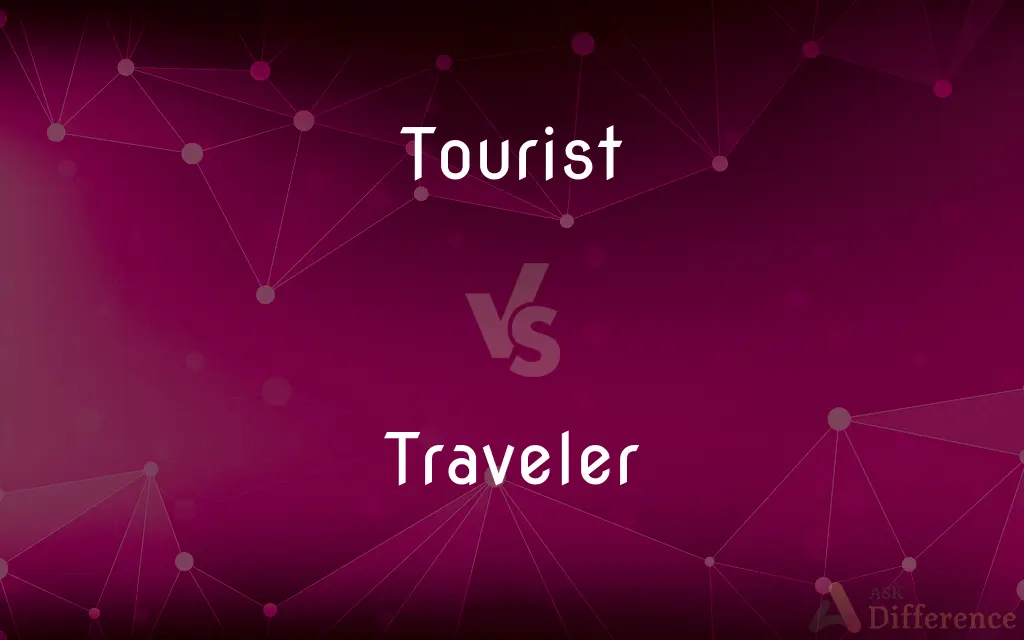Tourist vs. Traveler — What's the Difference?
By Fiza Rafique & Maham Liaqat — Updated on April 17, 2024
A tourist typically travels for leisure, visiting well-known locations and often following planned itineraries, whereas a traveler seeks more immersive experiences, often exploring off the beaten path and engaging more deeply with local cultures.

Difference Between Tourist and Traveler
Table of Contents
ADVERTISEMENT
Key Differences
Tourists usually prefer comfort, convenience, and seeing popular landmarks, focusing on sightseeing and relaxation during their trips. Travelers, on the other hand, tend to seek authenticity and adventure, prioritizing experiences that allow for cultural immersion and personal growth.
While tourists often rely on travel agencies and guided tours to manage their itinerary, travelers are more likely to plan their journeys independently, seeking unique and personal experiences rather than pre-packaged tours. This independence often leads to more spontaneous and flexible travel plans.
Tourists are typically associated with short-term stays and may visit multiple locations quickly to maximize the number of attractions they see. Travelers might spend extended periods in one location to better understand the local way of life and develop deeper connections with the place and its people.
The motivations of tourists often include relaxation and entertainment, with a preference for comfortable accommodations and easy access to amenities. Travelers might embrace challenges and learning opportunities, often opting for accommodations that involve local interaction, such as homestays or guesthouses.
While tourists may often be content with surface-level engagement with cultures—such as dining in tourist-friendly restaurants and visiting major museums—travelers seek deeper cultural engagement, possibly learning the language or participating in local customs and everyday activities.
ADVERTISEMENT
Comparison Chart
Focus
Leisure, famous sights
Cultural immersion, authenticity
Travel Style
Planned itineraries, guided tours
Independent, spontaneous journeys
Duration of Stay
Often short-term
Potentially long-term
Motivation
Sightseeing, relaxation
Exploration, personal growth
Accommodation Preferences
Hotels, resorts
Local guesthouses, homestays
Compare with Definitions
Tourist
Tourist refers to someone who travels for pleasure, especially one who visits places of interest.
The tourists flocked to the Louvre to see the Mona Lisa.
Traveler
A traveler is someone who goes on journeys typically to explore and engage with different cultures.
As an avid traveler, she spent months backpacking through Asia.
Tourist
Tourists may travel in groups and follow guided tours.
The group of tourists boarded the bus for a city tour.
Traveler
A traveler seeks experiences rather than just attractions, often staying in less touristy areas.
He prefers to stay in small villages to learn about local lifestyles.
Tourist
A tourist is often someone who stays in hotels and follows a set travel plan.
As a typical tourist, he booked a package tour to Niagara Falls.
Traveler
Travelers may learn new skills or languages to enhance their travel experiences.
She learned basic Spanish to communicate better while traveling in South America.
Tourist
Tourists usually travel to popular destinations and enjoy comfortable amenities.
Tourists in Hawaii often participate in organized beach activities.
Traveler
A traveler often has stories of personal growth and unique encounters.
The traveler shared stories of volunteering abroad during his travels.
Tourist
A tourist generally engages in sightseeing and visiting landmarks.
The city's economy thrives on tourists who visit its historic sites.
Traveler
Travelers often prefer less structured itineraries and more interaction with local people.
The traveler used a local map to find hidden gems in the city.
Tourist
One who travels for pleasure.
Traveler
One who travels or has traveled, as to distant places.
Tourist
Someone who travels for pleasure rather than for business.
Traveler
A traveling salesperson.
Tourist
(derogatory) One who visits a place or attends a social event out of curiosity, wanting to watch without commitment or involvement.
Traveler
A member of any of various groups of traditionally itinerant people living especially in Scotland and Ireland.
Tourist
A member of the visiting team in a match.
Traveler
A metal ring that moves freely back and forth on a rope, rod, or spar.
Tourist
A guest user on a computer system.
Traveler
The rope, rod, or spar on which such a ring moves.
Tourist
One who makes a tour, or performs a journey, especially for pleasure.
Traveler
A carriage that slides on a transverse track near the stern of a sailboat, providing an adjustable point of attachment for the mainsheet block.
Tourist
Someone who travels for pleasure
Traveler
Standard spelling of traveller
Traveler
One who travels; one who has traveled much.
Traveler
A commercial agent who travels for the purpose of receiving orders for merchants, making collections, etc.
Traveler
A traveling crane. See under Crane.
Traveler
The metal loop which travels around the ring surrounding the bobbin, in a ring spinner.
Traveler
An iron encircling a rope, bar, spar, or the like, and sliding thereon.
Traveler
A person who changes location
Common Curiosities
What is a traveler?
A traveler is someone who seeks to immerse themselves in new cultures and experiences, often preferring off-the-beaten-path adventures.
How do the goals of tourists and travelers differ?
Tourists often aim for relaxation and sightseeing, whereas travelers seek deeper understanding and personal growth through their journeys.
Can someone be both a tourist and a traveler?
Yes, many people combine elements of both styles, enjoying popular sights while also seeking authentic experiences.
Why do travelers avoid typical tourist spots?
Travelers often avoid crowded tourist spots to seek more authentic and less commercialized experiences.
How do tourists impact the places they visit?
Tourists can significantly impact local economies and infrastructure, sometimes leading to over-tourism.
How does a traveler plan their journey?
A traveler often plans with flexibility, allowing for spontaneous decisions and immersive experiences.
What type of accommodations do tourists and travelers prefer?
Tourists typically prefer hotels and resorts for comfort, while travelers might choose guesthouses or homestays for local experiences.
What is a tourist?
A tourist is someone who travels mainly for leisure and often visits popular destinations and attractions.
What drives a traveler to explore less known areas?
A passion for exploration, understanding diverse cultures, and personal growth motivates travelers to explore lesser-known areas.
Do travelers have a different impact on the places they visit compared to tourists?
Travelers might have a lesser impact by engaging more responsibly and sustainably with local communities.
How do travel agencies cater differently to tourists and travelers?
Travel agencies offer package tours and convenience for tourists, while providing customized and flexible options for travelers.
What motivates a tourist to travel?
Relaxation, entertainment, and the desire to visit well-known global landmarks motivate tourists.
What might a traveler learn from their journeys?
Travelers often learn about different cultures, languages, and perspectives that can significantly broaden their understanding of the world.
What is an example of a typical tourist destination?
Paris is a typical tourist destination, famous for attractions like the Eiffel Tower and the Louvre.
Are there specific activities that define a tourist?
Yes, activities like sightseeing, visiting theme parks, and dining at popular tourist-oriented restaurants typify a tourist.
Share Your Discovery

Previous Comparison
Bedbug vs. Chinch
Next Comparison
Infatuation vs. LoveAuthor Spotlight
Written by
Fiza RafiqueFiza Rafique is a skilled content writer at AskDifference.com, where she meticulously refines and enhances written pieces. Drawing from her vast editorial expertise, Fiza ensures clarity, accuracy, and precision in every article. Passionate about language, she continually seeks to elevate the quality of content for readers worldwide.
Co-written by
Maham Liaqat











































